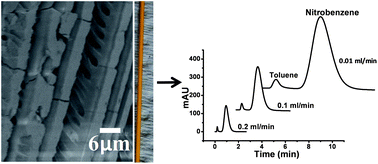Porous monolithic columns have been investigated and used to achieve fast separation with low back pressure and good resolution. Silica monoliths are favoured over polymeric monoliths due to their chemical/mechanical stability and non-swelling property. The monolithic columns with randomly distributed pore structures have been used so far, leading to eddy diffusion and peak broadening. Here, a directional freezing and freeze drying method is used for the first time to produce aligned porous silica monoliths in a silica capillary from commercially available silica colloidal suspension. Both silica and silica–polymer composite monoliths are produced and the full pore characterizations are performed. These monoliths contain parallel microchannels and thus minimize eddy diffusion. The HPLC tests on these monoliths under both normal phase and reversed phase conditions demonstrate the feasibility for use in chromatography. The aligned microchannel structures of the monoliths can achieve efficient separation with significantly low back pressure, compared to conventional porous monoliths. There is great potential to further develop this new type of monoliths for highly efficient HPLC with low operating back pressure.

